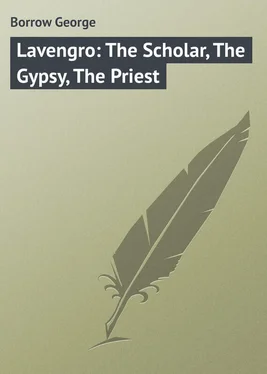George Borrow - Lavengro - The Scholar, The Gypsy, The Priest
Здесь есть возможность читать онлайн «George Borrow - Lavengro - The Scholar, The Gypsy, The Priest» — ознакомительный отрывок электронной книги совершенно бесплатно, а после прочтения отрывка купить полную версию. В некоторых случаях можно слушать аудио, скачать через торрент в формате fb2 и присутствует краткое содержание. Жанр: foreign_prose, на английском языке. Описание произведения, (предисловие) а так же отзывы посетителей доступны на портале библиотеки ЛибКат.
- Название:Lavengro: The Scholar, The Gypsy, The Priest
- Автор:
- Жанр:
- Год:неизвестен
- ISBN:нет данных
- Рейтинг книги:5 / 5. Голосов: 1
-
Избранное:Добавить в избранное
- Отзывы:
-
Ваша оценка:
- 100
- 1
- 2
- 3
- 4
- 5
Lavengro: The Scholar, The Gypsy, The Priest: краткое содержание, описание и аннотация
Предлагаем к чтению аннотацию, описание, краткое содержание или предисловие (зависит от того, что написал сам автор книги «Lavengro: The Scholar, The Gypsy, The Priest»). Если вы не нашли необходимую информацию о книге — напишите в комментариях, мы постараемся отыскать её.
Lavengro: The Scholar, The Gypsy, The Priest — читать онлайн ознакомительный отрывок
Ниже представлен текст книги, разбитый по страницам. Система сохранения места последней прочитанной страницы, позволяет с удобством читать онлайн бесплатно книгу «Lavengro: The Scholar, The Gypsy, The Priest», без необходимости каждый раз заново искать на чём Вы остановились. Поставьте закладку, и сможете в любой момент перейти на страницу, на которой закончили чтение.
Интервал:
Закладка:
At some distance from the city, behind a range of hilly ground which rises towards the south-west, is a small river, the waters of which, after many meanderings, eventually enter the principal river of the district, and assist to swell the tide which it rolls down to the ocean. It is a sweet rivulet, and pleasant is it to trace its course from its spring-head, high up in the remote regions of Eastern Anglia, till it arrives in the valley behind yon rising ground; and pleasant is that valley, truly a goodly spot, but most lovely where yonder bridge crosses the little stream. Beneath its arch the waters rush garrulously into a blue pool, and are there stilled, for a time, for the pool is deep, and they appear to have sunk to sleep. Farther on, however, you hear their voice again, where they ripple gaily over yon gravelly shallow. On the left, the hill slopes gently down to the margin of the stream. On the right is a green level, a smiling meadow, grass of the richest decks the side of the slope; mighty trees also adorn it, giant elms, the nearest of which, when the sun is nigh its meridian, fling a broad shadow upon the face of the pool; through yon vista you catch a glimpse of the ancient brick of an old English hall. It has a stately look, that old building, indistinctly seen, as it is, among those umbrageous trees; you might almost suppose it an earl’s home; and such it was, or rather upon its site stood an earl’s home, in days of old, for there some old Kemp, some Sigurd or Thorkild, roaming in quest of a hearthstead, settled down in the grey old time, when Thor and Freya were yet gods, and Odin was a portentous name. Yon old hall is still called the Earl’s Home, though the hearth of Sigurd is now no more, and the bones of the old Kemp, and of Sigrith his dame, have been mouldering for a thousand years in some neighbouring knoll; perhaps yonder, where those tall Norwegian pines shoot up so boldly into the air. It is said that the old earl’s galley was once moored where is now that blue pool, for the waters of that valley were not always sweet; yon valley was once an arm of the sea, a salt lagoon, to which the war-barks of ‘Sigurd, in search of a home,’ found their way.
I was in the habit of spending many an hour on the banks of that rivulet, with my rod in my hand, and, when tired with angling, would stretch myself on the grass, and gaze upon the waters as they glided past, and not unfrequently, divesting myself of my dress, I would plunge into the deep pool which I have already mentioned, for I had long since learned to swim. And it came to pass that on one hot summer’s day, after bathing in the pool, I passed along the meadow till I came to a shallow part, and, wading over to the opposite side, I adjusted my dress, and commenced fishing in another pool, beside which was a small clump of hazels.
And there I sat upon the bank, at the bottom of the hill which slopes down from ‘the Earl’s home’; my float was on the waters, and my back was towards the old hall. I drew up many fish, small and great, which I took from off the hook mechanically, and flung upon the bank, for I was almost unconscious of what I was about, for my mind was not with my fish. I was thinking of my earlier years – of the Scottish crags and the heaths of Ireland – and sometimes my mind would dwell on my studies – on the sonorous stanzas of Dante, rising and falling like the waves of the sea – or would strive to remember a couplet or two of poor Monsieur Boileau.
‘Canst thou answer to thy conscience for pulling all those fish out of the water, and leaving them to gasp in the sun?’ said a voice, clear and sonorous as a bell.
I started, and looked round. Close behind me stood the tall figure of a man, dressed in raiment of quaint and singular fashion, but of goodly materials. He was in the prime and vigour of manhood; his features handsome and noble, but full of calmness and benevolence; at least I thought so, though they were somewhat shaded by a hat of finest beaver, with broad drooping eaves.
‘Surely that is a very cruel diversion in which thou indulgest, my young friend?’ he continued.
‘I am sorry for it, if it be, sir,’ said I, rising; ‘but I do not think it cruel to fish.’
‘What are thy reasons for not thinking so?’
‘Fishing is mentioned frequently in Scripture. Simon Peter was a fisherman.’
‘True; and Andrew and his brother. But thou forgettest: they did not follow fishing as a diversion, as I fear thou doest. – Thou readest the Scriptures?’
‘Sometimes.’
‘Sometimes? – not daily? – that is to be regretted. What profession dost thou make? – I mean to what religious denomination dost thou belong, my young friend?’
‘Church.’
‘It is a very good profession – there is much of Scripture contained in its liturgy. Dost thou read aught besides the Scriptures?’
‘Sometimes.’
‘What dost thou read besides?’
‘Greek, and Dante.’
‘Indeed! then thou hast the advantage over myself; I can only read the former. Well, I am rejoiced to find that thou hast other pursuits beside thy fishing. Dost thou know Hebrew?’
‘No?’
‘Thou shouldst study it. Why dost thou not undertake the study?’
‘I have no books.’
‘I will lend thee books, if thou wish to undertake the study. I live yonder at the hall, as perhaps thou knowest. I have a library there, in which are many curious books, both in Greek and Hebrew, which I will show to thee, whenever thou mayest find it convenient to come and see me. Farewell! I am glad to find that thou hast pursuits more satisfactory than thy cruel fishing.’
And the man of peace departed, and left me on the bank of the stream. Whether from the effect of his words, or from want of inclination to the sport, I know not, but from that day I became less and less a practitioner of that ‘cruel fishing.’ I rarely flung line and angle into the water, but I not unfrequently wandered by the banks of the pleasant rivulet. It seems singular to me, on reflection, that I never availed myself of his kind invitation. I say singular, for the extraordinary, under whatever form, had long had no slight interest for me; and I had discernment enough to perceive that yon was no common man. Yet I went not near him, certainly not from bashfulness or timidity, feelings to which I had long been an entire stranger. Am I to regret this? perhaps, for I might have learned both wisdom and righteousness from those calm, quiet lips, and my after-course might have been widely different. As it was, I fell in with other guess companions, from whom I received widely different impressions than those I might have derived from him. When many years had rolled on, long after I had attained manhood, and had seen and suffered much, and when our first interview had long since been effaced from the mind of the man of peace, I visited him in his venerable hall, and partook of the hospitality of his hearth. And there I saw his gentle partner and his fair children, and on the morrow he showed me the books of which he had spoken years before by the side of the stream. In the low quiet chamber, whose one window, shaded by a gigantic elm, looks down the slope towards the pleasant stream, he took from the shelf his learned books, Zohar and Mishna, Toldoth Jesu and Abarbenel. ‘I am fond of these studies,’ said he, ‘which, perhaps, is not to be wondered at, seeing that our people have been compared to the Jews. In one respect I confess we are similar to them; we are fond of getting money. I do not like this last author, this Abarbenel, the worse for having been a money-changer. I am a banker myself, as thou knowest.’
And would there were many like him, amidst the money-changers of princes! The hall of many an earl lacks the bounty, the palace of many a prelate the piety and learning, which adorn the quiet Quaker’s home!
Читать дальшеИнтервал:
Закладка:
Похожие книги на «Lavengro: The Scholar, The Gypsy, The Priest»
Представляем Вашему вниманию похожие книги на «Lavengro: The Scholar, The Gypsy, The Priest» списком для выбора. Мы отобрали схожую по названию и смыслу литературу в надежде предоставить читателям больше вариантов отыскать новые, интересные, ещё непрочитанные произведения.
Обсуждение, отзывы о книге «Lavengro: The Scholar, The Gypsy, The Priest» и просто собственные мнения читателей. Оставьте ваши комментарии, напишите, что Вы думаете о произведении, его смысле или главных героях. Укажите что конкретно понравилось, а что нет, и почему Вы так считаете.












